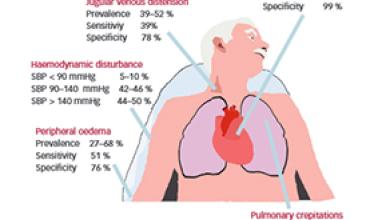Search results
Author(s):
Lampros Papadimitriou
,
Charles K Moore
,
Javed Butler
,
et al
Added:
4 years ago
Heart failure (HF) is a global epidemic which affects about 6 million adults in the US. It is projected that by 2030 the total cost of HF will reach US$70 billion. Despite the development of novel drugs and devices, the mortality burden of HF remains high, with one in three patients dying within 1 year of hospitalisation for HF and 40–50% within 5 years of diagnosis.1
Patients with HF are…
View more
Author(s):
Cristiana Vitale
,
Ilaria Spoletini
,
Giuseppe Rosano
Added:
3 years ago
Because of the ageing population in industrialised countries, the prevalence of cardiovascular disease has dramatically increased.1 In particular, heart failure (HF) has become a major public health problem and the leading cause of morbidity, hospitalisation and mortality in older people.2,3
Patients with HF, especially the oldest, are often characterised by a “vulnerability status” due to the…
View more
Author(s):
Sivadasanpillai Harikrishnan
Added:
3 years ago
“All diseases begin in the gut.”
– Hippocrates (460–370 BC)
In recent years many researchers have described the relationship between the gut microbiota and many diseases, including heart disease, hypertension, diabetes and obesity.1,2 Diet is one of the major factors that influence the pattern of the gut microbiota.3 This article discusses how the gut microbiota affects heart failure.
What is…
View more
Author(s):
Izabella Uchmanowicz
,
Agnieszka Młynarska
,
Magdalena Lisiak
,
et al
Added:
3 years ago
The first paper that referred to the problem of ‘frail elderly patients’ was published in 1953, and frailty syndrome (FS) was first described in the 1990s.1,2 Although it has long been recognised and diagnosed, no consensus definition of this clinical syndrome has been established. The Second International Working Meeting on Frailty and Aging in 2006 concluded that FS involves increased…
View more
Author(s):
Christopher J Allen
,
Kaushik Guha
,
Rakesh Sharma
Added:
3 years ago
Acute heart failure (AHF) is a leading cause of hospitalisation in developed nations, responsible for 67,000 admissions a year in the UK alone, an incidence which is set to increase with an ageing population.1 The prognosis remains poor: in-hospital mortality ranges from 4–11 % and in those patients surviving to discharge 50 % will be re-admitted and one-third will die within 12 months.2–6 These…
View more
Author(s):
Marco Metra
,
Elisabetta Dinatolo
,
Nicolò Dasseni
Added:
3 years ago
Despite improvements in treatment, heart failure (HF) continues to have a progressive clinical course characterised by worsening of cardiac function and clinical condition, leading to a stage of advanced chronic HF. At this stage, the clinical picture is characterised by severe symptoms, frequent episodes of decompensation, poor quality of life and poor survival. Evidence-based medical treatments…
View more
Author(s):
Aliza Hussain
,
Arunima Misra
,
Biykem Bozkurt
Added:
2 years ago
Author(s):
Domenico D’Amario
,
Francesco Canonico
,
Daniele Rodolico
,
et al
Added:
3 years ago
Heart failure (HF) is a complex clinical syndrome associated with a heavy burden of symptoms and a wide range of therapeutic options.1–5 Despite improvements in HF management over past decades, we still need approaches that might mitigate the effects of this disease, preventing its insidious onset and worsening of symptoms, such as acute decompensations. A trend has recently emerged to extend the…
View more
Author(s):
Edo Y Birati
,
Mariell Jessup
Added:
3 years ago
Heart failure (HF) is a leading cause of morbidity and mortality worldwide, affecting 1–2% of the adult population in western countries with incidence of 5–10 per 1000 persons per year.1,2 It is estimated that the prevalence of HF will continue to increase as the population ages and, according to the American Heart Association (AHA), by the year 2030 the prevalence of HF in the US alone will rise…
View more
Author(s):
Ernest Spitzer
,
Rebecca T Hahn
,
Philippe Pibarot
,
et al
Added:
3 years ago
Symptomatic severe aortic stenosis (AS) is the most common indication for valvular interventions.1 AS is a degenerative and progressive disease that characteristically remains asymptomatic for decades but once symptoms occur, survival is severely compromised. Historical data have shown that the time from the onset of symptoms to death is about 2 years in patients who develop heart failure (HF)…
View more















